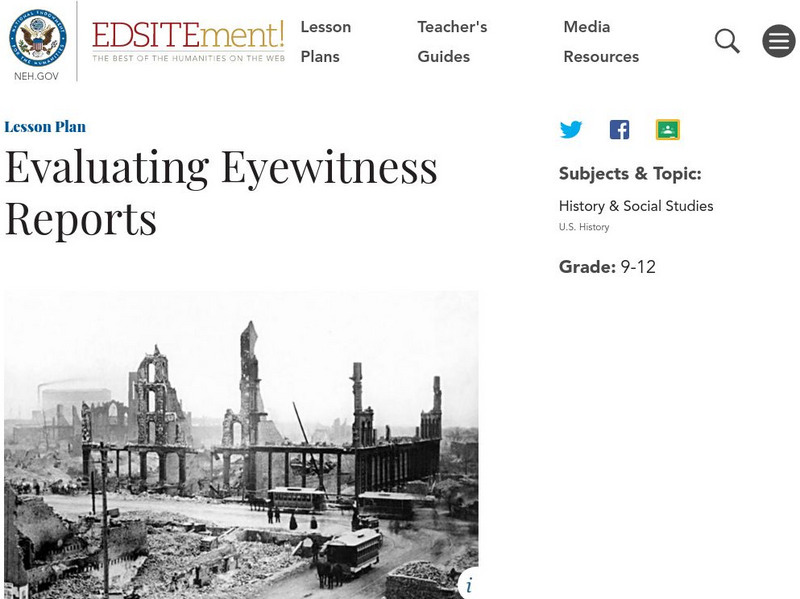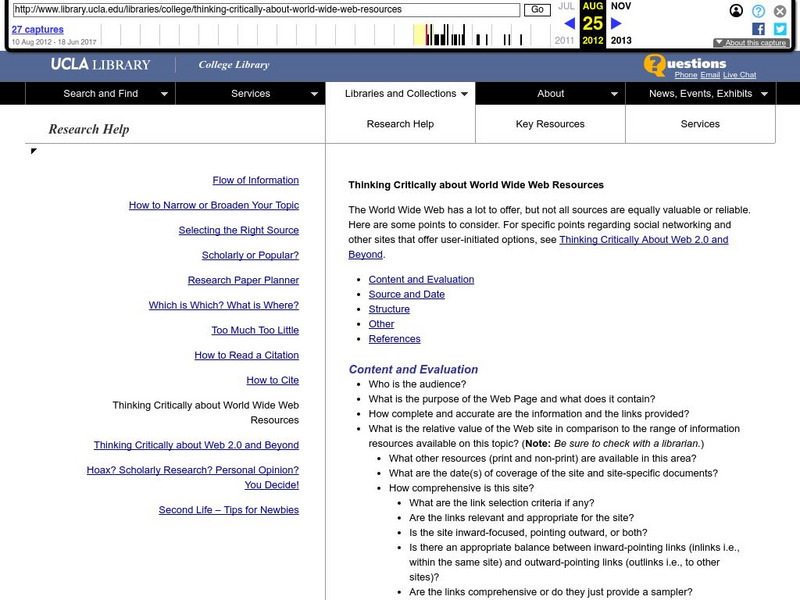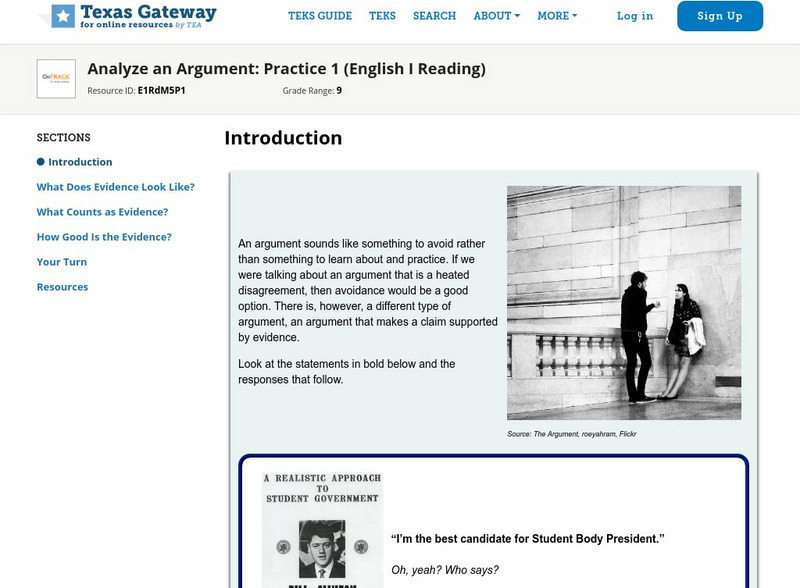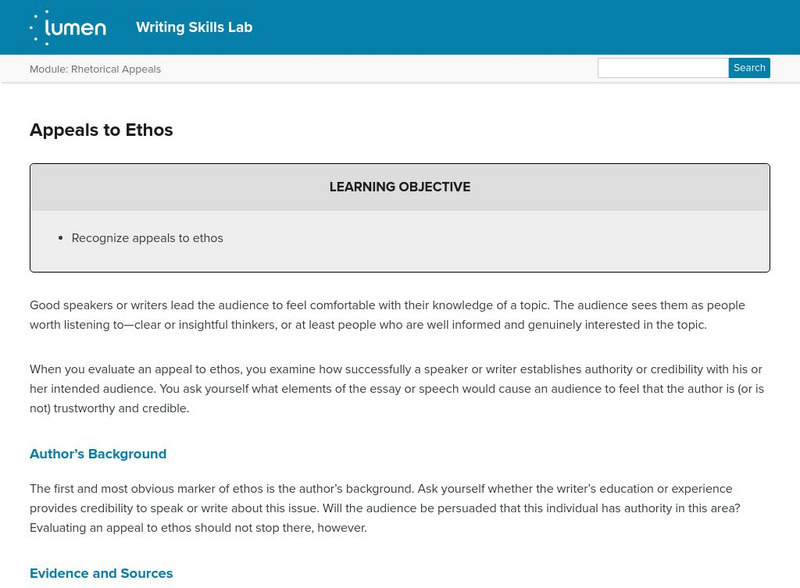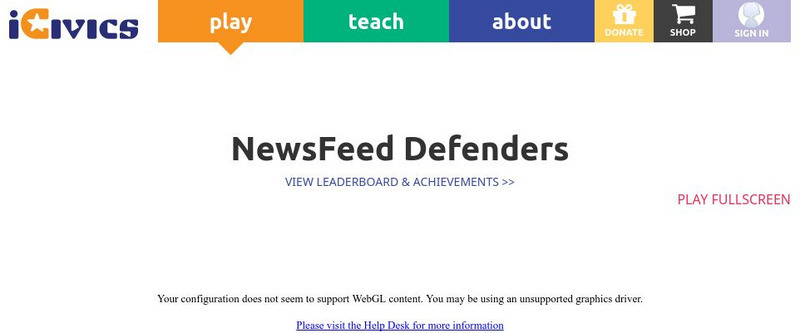Hi, what do you want to do?
Lumen Learning
Lumen: Using Sources: Putting It Together: Using Sources
This is a summary of the lessons on integrating credible sources using paraphrase, summary, and quotations and citing sources. Click on the Next button on the bottom right to learn about Why It Matters: Multimodality; you will have the...
Other
Central Michigan University: Website Research: Fake News
Critical appraisal tests like CRAAP and RADAR can also be used to evaluate the credibility of news websites and the stories they produce (which often go viral on social media). Here are some more resources to help you check! (CRAAP...
National Endowment for the Humanities
Neh: Edsit Ement: Evaluating Eyewitness Reports
In this lesson, students practice working with primary documents by comparing accounts of the Chicago Fire and testing the credibility of a Civil War diary.
University of California
Ucla College Library: Thinking Critically About World Wide Web Resources
This site teaches readers how to evaluate the content and quality of web resources, offering questions and checklists to consider.
Sophia Learning
Sophia: Critiquing a Source
This lesson goes over how to critique a research source for reliability. W.11-12.8 Sources/Integrate/Cite
PBS
Pbs Learning Media: News and Media Literacy
This collection, which includes videos, blog articles, student handouts, lesson plans, and tip sheets for families, helps students identify, analyze, and investigate the news and information they get from online sources. Media literacy...
Texas Education Agency
Texas Gateway: Analyze an Argument: Practice 1 (English I Reading)
In this lesson, students practice analyzing the evidence that supports or opposes an argument. They are also going to learn to analyze the quality, relevance, and credibility of the evidence so you can decide whether to accept the...
Better Lesson
Better Lesson: Avoiding Plagiarism and Citing Sources
In this scaffolded lesson, students engage in practice with determining whether or not research has been plagiarized. A short video demonstration is included. [03:44] This lesson addresses all three College and Career Readiness Standards...
ReadWriteThink
Read Write Think: Hoax/no Hoax? Online Comprehension and Evaluation Strategies
Students use research-based comprehension strategies to read and evaluate websites, and practice analysis by comparing hoax and real websites and by identifying false or misleading information. SL.11-12.2 Eval&Integrate sources
Other
Walt's Navigating the Net Forum: Evaluating Quality
This article helps searchers develop evaluation skills in judging information and helps web content developers increase the credibility of their materials for those looking for quality on the net.
Cornell University
Cornell University: Library: Critically Analyzing Information Sources
A quick guide to help you determine the relevance and authority of a resource.
International Reading Association
Reading Online: Classroom Strategies for Exploring Authenticity in the Media
Four innovative classroom activities that actively engage students in analyzing and criticizing media messages. SL.11-12.2 Eval&Integrate sources
Media Smarts
Media Smarts: How to Recognize False Content Online: The New 5 Ws [Pdf]
A tip sheet to help both students and adults learn how to test online content for validity.
Other
Media Education Lab: My Pop Studio
[Free Registration/Login Required] Get ready to go behind-the-scenes of the television you watch, magazines you read, music you listen to, and websites you visit! The 'studios' let you.. Create, Comment, Control. Targeted at girls, the...
Other
Information Literacy Activities
These worksheets cover many aspects of the research process, as well as censorship, web page evaluation and boolean operators.
PBS
Pbs Learning Media: Common Sense Education: Identifying High Quality Sites
Learn how to "test before you trust" the sites and information found on the Web in this lesson plan and student handout from Common Sense Education. Assessing what you find on the Web is an essential skill for today's learners. Use this...
Lumen Learning
Lumen: Rhetorical Appeals: Appeals to Ethos
This lesson focuses on appeals to Ethos, When you evaluate an appeal to ethos, how successfully a speaker or writer establishes authority or credibility with his or her intended audience. You ask yourself what elements of the essay or...
Thinkport Education
Thinkport: Assessing an Author's Claims
Learn how to evaluate resoruces and author's claims.
Information Fluency
Illinois Mathematics and Science Academy: Micromodules: Author
Tutorial explaining the importance of determining the authorship as one of the criteria to evaluating a website. Following the article is a post-test to assess your understanding of the material. The 21st Century Information Fluency...
iCivics
I Civics: News Feed Defenders
NewsFeed Defenders is a challenging game designed to sharpen students' news literacy skills. Students will join a fictional social media site focused on news and information. They will learn elements of high-quality journalism to be able...
Other
Scholarly Resources: What's the Difference?
This succinct explanation shows you what the difference is between a scholarly and a popular periodical or other resource.







